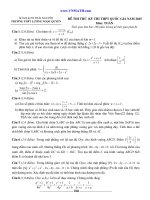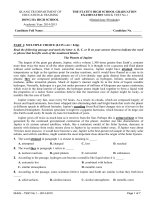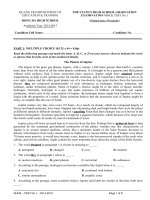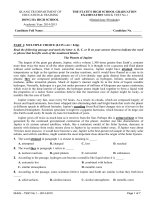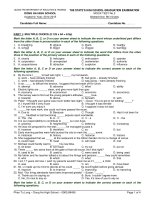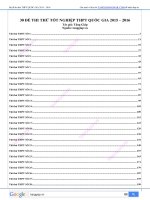Tải Đề thi thử THPT Quốc gia năm 2016 môn Tiếng Anh trường THPT Đông Hà, Quảng Trị (Lần 1) - Đề thi thử Đại học môn Tiếng Anh năm 2016 có đáp án
Bạn đang xem bản rút gọn của tài liệu. Xem và tải ngay bản đầy đủ của tài liệu tại đây (142.87 KB, 10 trang )
<span class='text_page_counter'>(1)</span><div class='page_container' data-page=1>
<b>TRƯỜNG THPT ĐÔNG HÀ</b>
<b></b>
<b>---ĐỀ THI THỬ THPT QUỐC GIA LẦN 1</b>
<b>NĂM HỌC 2015 - 2016</b>
<b>MÔN: TIẾNG ANH</b>
<b>Ngày thi: ..../04/2016</b>
<b>Thời gian làm bài: 90 phút</b>
Họ và tên thí sinh: ………. SBD: …...
<b>SECTION A (8 points)</b>
<i><b>Mark the letter A, B, C, or D on your answer sheet to indicate the word whose underlined part differs from</b></i>
<i><b>the other three in pronunciation in each of the following questions.</b></i>
<b>Question 1: A. humor </b> <b>B. honest </b> <b>C. hotel </b> <b>D. hurry</b>
<i><b>Question 2:</b></i> <b>A. naked </b> <b>B. learned </b> <b>C. studied</b> <b>D. sacred </b>
<i><b>Mark the letter A, B, C, or D on your answer sheet to indicate the word that differs from the other three in</b></i>
<i><b>the position of primary stress in each of the following questions.</b></i>
<b>Question 3: A. delivery</b> <b>B. approval</b> <b>C. invent</b> <b>D. compromise</b>
<b>Question 4: A. consolidate</b> <b>B. temperate</b> <b>C. opposite</b> <b>D. decorate</b>
<b>Question 5: A. migrate</b> <b>B. conclude</b> <b>C. credit</b> <b>D. apply</b>
<i><b>Mark the letter A, B, C, or D on your answer sheet to indicate the correct answer to each of the following</b></i>
<i><b>questions.</b></i>
<b>Question 6: Whether you believe it or not, it is _____ that causes your illness.</b>
<b>A. because of your overweight</b> <b>B. you are so overweight</b>
<b>C. your being overweight</b> <b>D. because you are overweight</b>
<b>Question 7: Mary: “How did you get here ?” John: “_____” </b>
<b>A. Is it far from here?</b> <b>B. I came here last night. C. The train is so crowded.</b> <b>D. I came here by</b>
train.
<b>Question 8: He doesn't do anything but _____ pride in himself.</b>
<b>A. takes</b> <b>B. is taking</b> <b>C. take</b> <b>D. will take</b>
<b>Question 9: It is urgent that this letter _____ immediately. </b>
<b>A. be posted</b> <b>B. be post</b> <b>C. was posted</b> <b>D. posted</b>
<b>Question 10: I remember _____ him _____ the grass needed _____.</b>
<b>A. hear / say / cutting</b> <b>B. heard / say / cutting</b> <b>C. hearing / say / cutting D. hearing / saying /</b>
cutting
<b>Question 11: The desks and the chairs are in good order and the floor is so clean. The room _____.</b>
</div>
<span class='text_page_counter'>(2)</span><div class='page_container' data-page=2>
<b>Question 12: I found _____ strange _____ nobody had said anything at the meeting.</b>
<b>A. that / that</b> <b><sub>B. it / </sub></b> <b>C. this / that</b> <b>D. it / that</b>
<b>Question 13: No one knows his address _____ his daughter.</b>
<b>A. except</b> <b>B. besides</b> <b>C. excepting</b> <b>D. beside</b>
<b>Question 14: Peter: “Thanks a lot for your wonderful gift.” – Mary: “_____.” </b>
<b>A. You are welcome</b> <b>B. Thank you</b> <b>C. Cheers</b> <b>D. Have a good day</b>
<b>Question 15: It is believed that no animals can stay alive in _____ water at 1,500 meters below _____ sea</b>
level.
<b>A. the / </b> <b>B. / a</b> <b>C. the / the</b> <b><sub>D. / </sub></b>
<b>Question 16: I need to buy two _____ of color _____.</b>
<b>A. boxes / chalks</b> <b>B. boxes / chalks</b> <b>C. boxes / chalk</b> <b>D. boxs / chalk</b>
<b>Question 17: _____ to play with the kids!</b>
<b>A. What a fun it is</b> <b>B. What a fun is it</b> <b>C. What fun it is</b> <b>D. How fun it is</b>
<b>Question 18: You should not have made _____ spelling mistakes.</b>
<b>A. many such</b> <b>B. such many</b> <b>C. so much</b> <b>D. such more</b>
<b>Question 19: When I went in, the old man was sitting in an armchair _____ out of the window.</b>
<b>A. stare</b> <b>B. staring</b> <b>C. stared</b> <b>D. was staring</b>
<b>Question 20: On hearing the news that her husband was killed by terrorists, the wife _____.</b>
<b>A. broke down</b> <b>B. broke up</b> <b>C. broke away</b> <b>D. broke out</b>
<b>Question 21: Americans eat _____ vegetables per person today as they did in 1910.</b>
<b>A. as twice as many</b> <b>B. more than twice many C. twice as many</b> <b>D. more than twice</b>
<b>Question 22: I'm sure this painting is not by Picasso. It's only an unsuccessful fake and so it's _____.</b>
<b>A. priceless</b> <b>B. worthless</b> <b>C. precious</b> <b>D. invaluable</b>
<b>Question 23: The most important thing to keep in mind when _____ an emergency is to stay _____.</b>
<b>A. dealt with / calm</b> <b>B. to deal with / calm</b> <b>C. dealing with / calmly D. dealing with / calm</b>
<b>Question 24: Somebody must have Tom's phone number, _____?</b>
<b>A. mustn’t they</b> <b>B. needn’t they</b> <b>C. mustn’t it</b> <b>D. needn’t it</b>
<i><b>Mark the letter A, B, C, or D on your answer sheet to indicate the word(s) CLOSEST in meaning to the</b></i>
<i><b>underlined word(s) in each of the following questions.</b></i>
<b>Question 25: I think the medicine is beginning to wear off.</b>
<b>A. stop being effective</b> <b>B. take effect </b> <b>C. be put in a bottle </b> <b>D. be swallowed </b>
<b>Question 26: His patents completely believe in him. He can do things at random.</b>
<b>A. at stake </b> <b>B. at will </b> <b>C. at once </b> <b>D. at hand</b>
</div>
<span class='text_page_counter'>(3)</span><div class='page_container' data-page=3>
<b>A. disrespectful </b> <b>B. regardless </b> <b>C. considering </b> <b>D. in spite</b>
<i><b>Mark the letter A, B, C, or D on your answer sheet to indicate the underlined part that needs correction in</b></i>
<i><b>each of the following questions.</b></i>
<b>Question 28: My boss requested me that I use my vacation days before the end of the year.</b>
<b> A B C D</b>
<b>Question 29: I tried to explain him the problem, but he had difficulty understanding me.</b>
<b> A B C D</b>
<b>Question 30: Kevin says he stopped to travel internationally because of his family.</b>
<b> A B C D</b>
<b>Question 31: He told me that he had never been in that restaurant before.</b>
<b> A B C D</b>
<b>Question 32: Unfortunately</b> , the species has gotten extinct due to human activity.
<b> A B C D</b>
<i><b>Read the following passage and mark the letter A, B, C, or D on your answer sheet to indicate the correct</b></i>
<i><b>word or phrase that best fits each of the numbered blanks from 33 to 42.</b></i>
If you’ve been told by your boss to improve your knowledge of a foreign language you’ll know that
success doesn’t come quickly. It generally takes years to learn another language well and constant (33) _____
to maintain the high standards required for frequent business use. Whether you study in a class, with audio
cassettes, computers or on your (34) _____ sooner or (35) _____ every language course finishes and you
must decide what to do next if you need a foreign language for your career. Business Audio Magazine is a
new product designed to help you continue language study in a way that fits easily into your busy schedule.
Each audio cassette (36) _____ of an hour-long program packed with business news, features and interviews
in the language of your choice. These cassettes won’t teach you how to order meals or ask for directions. It’s
(37) _____ that you can do that already. Instead, by giving you an opportunity to hear the language as it’s
really spoken, they help you to (38) _____ your vocabulary and improve your ability to use real language
relating to, for example, that all-important marketing trip. The great advantage of using audio magazines is
that they (39) _____ you to perfect your language skills in ways that suit your lifestyle. For example, you can
select a topic and listen in your car or hotel when away on business. No other business course is as (40)
_____ and the unique radio magazine format is as instructive as it’s entertaining. In addition to the audio
cassette, this package includes a transcript with a business glossary and a study (41) _____. The components
are structured so that intermediate and advanced students may use separately or together, (42) _____ on their
ability.
<b>Question 33: A. exercise </b> <b>B. performance </b> <b>C. practice </b> <b>D. operator </b>
</div>
<span class='text_page_counter'>(4)</span><div class='page_container' data-page=4>
<b>Question 35: A. after </b> <b>B. then </b> <b>C. later </b> <b>D. quicker </b>
<b>Question 36: A. consists </b> <b>B. includes </b> <b>C. contains </b> <b>D. involves </b>
<b>Question 37: A. insisted </b> <b>B. acquired </b> <b>C. asserted </b> <b>D. assumed </b>
<b>Question 38: A. prolong </b> <b>B. extend </b> <b>C. spread </b> <b>D. lift </b>
<b>Question 39: A. allow </b> <b>B. let </b> <b>C. support </b> <b>D. offer </b>
<b>Question 40: A. adjustable </b> <b>B. flexible </b> <b>C. convertible </b> <b>D. variable </b>
<b>Question 41: A. addition </b> <b>B. supplement </b> <b>C. extra </b> <b>D. manuscript </b>
<b>Question 42: A. according </b> <b>B. depending </b> <b>C. relating </b> <b>D. basing</b>
<i><b>Mark the letter A, B, C, or D on your answer sheet to indicate the word(s) OPPOSITE in meaning to the</b></i>
<i><b>underlined word(s) in each of the following questions.</b></i>
<b>Question 43: We offer a speedy and secure service of transferring money in less than 24 hours.</b>
<b>A. uninterested</b> <b>B. unsure</b> <b>C. slow</b> <b>D. open</b>
<b>Question 44: Fruit and vegetables grew in abundance on the island. The islanders even exported the</b>
surplus.
<b>A. small quantity</b> <b>B. sufficiency</b> <b>C. excess</b> <b>D. large quantity</b>
<i><b>Read the following passage and mark the letter A, B, C, or D on your answer sheet to indicate the correct</b></i>
<i><b>answer to each of the questions from 45 to 54.</b></i>
Choosing a career may be one of the hardest jobs you ever have, and it must be done with care. View a
career as an opportunity to do something you love, not simply as a way to earn a living. Investing the time
and effort to thoroughly explore your options can mean the difference between finding a stimulating and
rewarding career and move from job to unsatisfying job in an attempt to find the right one. Work influences
virtually every aspect of your life, from your choice of friends to where you live. Here are just a few of the
factors to consider.
Deciding what matters most to you is essential to making the right decision. You may want to begin
<i><b>by assessing</b><b> your likes, dislikes, strengths, and weaknesses. Think about the classes, hobbies, and</b></i>
surroundings that you find most appealing. Ask yourself questions, such as “Would you like to travel? Do
<i>you want to work with children? Are you more suited to solitary or cooperative work?” There are no right or</i>
<i>wrong answers; only you know what is important to you. Determine which job features you require, which</i>
<i><b>ones you would prefer, and which ones you cannot accept. Then rank them</b><b> in order of importance to you.</b></i>
</div>
<span class='text_page_counter'>(5)</span><div class='page_container' data-page=5>
hand, many industries such as hospitality, law education, and retail sales are found in all regions of the
country.
If a high salary is important to you, do not judge a career by its starting wages. Many jobs, such as
insurance sales, offers relatively low starting salaries; however, pay substantially increases along with your
experience, additional training, promotions and commission.
<i><b>Don’t rule out any occupation without learning more about it. Some industries evoke</b><b> positive or negative</b></i>
<i><b>associations. The traveling life of a flight attendant appears glamorous, while that</b><b> of a plumber does not.</b></i>
Remember that many jobs are not what they appear to be at first, and may have merits or demerits that are
<i>less obvious. Flight attendants must work long, grueling hours without sleeps, whereas plumbers can be as</i>
highly paid as some doctors.
Another point to consider is that as you mature, you will likely develop new interests and skills that may
point the way to new opportunities. The choice you make today need not be your final one.
<i><b>Question 45: The author states that “There are no right or wrong answers” in paragraph 2 in order to</b></i>
_____.
<b>A. emphasize that each person’s answers will be different.</b>
<b>B. show that answering the questions is a long and difficult process.</b>
<b>C. indicate that the answers are not really important.</b>
<b>D. indicate that each person’s answers may change over time.</b>
<i><b>Question 46: The word “them” in paragraph 2 refers to _____.</b></i>
<b>A. questions </b> <b>B. answers </b> <b>C. features D. jobs</b>
<i><b>Question 47: The word “assessing” in paragraph 2 could best be replaced by _____.</b></i>
<b>A. discovering </b> <b>B. considering </b> <b>C. measuring </b> <b>D. disposing</b>
<b>Question 48: According to paragraph 3, which of the following fields is NOT suitable for a person who</b>
does not want to live in a big city?
<b>A. plumbing </b> <b>B. law </b> <b>C. retail sales </b> <b>D. advertising</b>
<i><b>Question 49: The word “evoke” in paragraph 5 is closest in meaning to _____.</b></i>
<b>A. agree on </b> <b>B. bring to mind </b> <b>C. be related to </b> <b>D. differ from</b>
<i><b>Question 50: The word “that” in paragraph 5 refers to .</b></i>
<b>A. occupation </b> <b>B. the traveling life </b> <b>C. a flight attendant </b> <b>D. commission</b>
<b>Question 51: It can be inferred from the paragraph 4 that _____.</b>
<b>A. jobs in insurance sales are generally not well-paid.</b>
<b>B. insurance sales people can earn high salary later in their career.</b>
<b>C. people should constantly work toward the next promotion.</b>
</div>
<span class='text_page_counter'>(6)</span><div class='page_container' data-page=6>
<b>Question 52: In paragraph 6, the author suggests that _____.</b>
<b>A. you may want to change careers at some time in the future.</b>
<b>B. as you get older, your career will probably less fulfilling.</b>
<b>C. you will be at your job for a lifetime, so choose carefully.</b>
<b>D. you will probably jobless at some time in the future.</b>
<i><b>Question 53: Why does the author mention “long, grueling hours without sleeps” in paragraph 5?</b></i>
<b>A. To emphasize the difficulty of working as a plumber.</b>
<b>B. To contrast the reality of a flight attendant’s job with most people’s perception.</b>
<b>C. To show that people must work hard for the career they have chosen.</b>
<b>D. To discourage readers from choosing a career as a flight attendant.</b>
<b>Question 54: According to the passage, which of the following is TRUE?</b>
<b>A. To make a lot of money, you should not take a job with a low starting salary.</b>
<b>B. To make lots of money, you should rule out all factory jobs.</b>
<b>C. If you want an easy and glamorous lifestyle, you should consider becoming flight attendant</b>
<b>D. Your initial view of certain careers may not be accurate.</b>
<i><b>Read the following passage and mark the letter A, B, C, or D on your answer sheet to indicate the correct</b></i>
<i><b>answer to each of the questions from 55 to 64.</b></i>
Quite different from storm surges are the giant sea waves called tsunamis, which derive their name from
the Japanese expression for "high water in a harbor". These waves are also referred to by the general public
as tidal waves, although they have relatively little to do with tides. Scientists often refer to them as seismic
sea waves, far more appropriate in that they do result from undersea seismic activity.
Tsunamis are caused when the sea bottom suddenly moves, during an underwater earthquake or volcano,
<i><b>for example, and the water above the moving earth is suddenly displaced. This sudden shift of water sets off</b></i>
a series of waves. These waves can travel great distances at speeds close to 700 kilometers per hour. In the
open ocean, tsunamis have little noticeable amplitude, often no more than one or two meters. It is when they
<i><b>hit the shallow water the coast that they increase in height, possibly up to 40 meters. </b></i>
</div>
<span class='text_page_counter'>(7)</span><div class='page_container' data-page=7>
<i><b>Tsunamis are certainly not limited to Japan and Hawaii. In 1755, Europe experienced a calamitous</b></i>
tsunami, when movement along the fault lines near the Azores caused a massive tsunami to sweep onto the
<i><b>Portuguese coast and flood the heavily populated area around Lisbon. The greatest tsunami on record</b></i>
occurred on the other side of the world in 1883 when the Krakatoa volcano underwent a massive explosion,
sending waves more than 30 meters high onto nearby Indonesian islands; the tsunami from this volcano
actually traveled around the world and was witnessed as far away as the English Channel.
<b>Question 55: The paragraph preceding this passage most probably discusses _____.</b>
<b>A. underwater earthquakes B. storm surges </b> <b>C. tides </b> <b>D. tidal waves </b>
<b>Question 56: According to the passage, all of the following are true about tidal waves EXCEPT that</b>
_____.
<b>A. they're caused by sudden changes in high and low tides </b>
<b>B. they refer to the same phenomenon as seismic sea waves </b>
<b>C. they are the same as tsunamis </b>
<b>D. this terminology is not used by the scientific community </b>
<i><b>Question 57: The world "displaced" in the second paragraph is closest in meaning to _____. </b></i>
<b>A. located </b> <b>B. filtered </b> <b>C. moved </b> <b>D. not pleased </b>
<b>Question 58: It can be inferred from the passage that tsunamis _____.</b>
<b>A. are often identified by ships on the ocean </b>
<b>B. generally reach heights greater than 40 meters </b>
<b>C. are far more dangerous on the coast than in the open ocean </b>
<b>D. cause severe damage in the middle of the ocean </b>
<i><b>Question 59: As used in the passage, water that is "shallow" in the second paragraph isn't _____.</b></i>
<b>A. coastal </b> <b>B. deep </b> <b>C. clear </b> <b>D. tidal </b>
<b>Question 60: A main difference between tsunamis in Japan and in Hawaii is that tsunamis in Japan are more</b>
likely to _____.
<b>A. come from greater distances </b> <b>B. be less of a problem </b>
<b>C. originate in Alaska </b> <b>D. arrive without warning </b>
<i><b>Question 61: The possessive "their" in the third paragraph refers to _____.</b></i>
<b>A. these tsunamis </b> <b>B. the inhabitants of Hawaii </b>
<b>C. the Hawaiian islands </b> <b>D. thousands of miles </b>
<i><b>Question 62: A "calamitous" tsunami in the last paragraph is one that is _____.</b></i>
<b>A. at fault </b> <b>B. expected </b> <b>C. disastrous </b> <b>D. extremely calm </b>
</div>
<span class='text_page_counter'>(8)</span><div class='page_container' data-page=8>
<b>A. might not be the greatest tsunami ever </b> <b>B. was not as strong as the tsunami in Lisbon </b>
<b>C. was filmed as it was happening </b> <b>D. occurred before efficient records were kept </b>
<b>Question 64: The passage suggests that - the tsunami resulting from the Krakatoa volcano _____.</b>
<b>A. was unobserved outside of the Indonesian islands </b>
<b>B. resulted in little damage </b>
<b>C. caused volcanic explosions in the English Channel </b>
<b>D. was far more destructive close to the source than far away</b>
<b>SECTION B (2 points)</b>
<i><b>I. Finish each of the following sentences in such a way that it means the same as the sentence printed</b></i>
<i><b>before it. Write your answers on your answer sheet.</b></i>
<b>Question 1: The owners of newspapers are usually very rich.</b>
The people...
<b>Question 2: Alice eats very little so as not to put on weight.</b>
Alice eats ...
<b>Question 3: After the beginning of the opera, late comers had to wait before taking their seats.</b>
Once...
<b>Question 4: Brown had failed twice, so he didn’t want to try again.</b>
Having ...
<b>Question 5: He had hardly left the office when the telephone rang.</b>
No sooner ...
<i><b>II. In about 140 words, write a paragraph about the kind of job you would like to do after you finish your</b></i>
<i><b>education. </b></i>
</div>
<span class='text_page_counter'>(9)</span><div class='page_container' data-page=9>
<b>---ANSWER KEYS</b>
<b>SECTION A (0.125p x 64 = 8 points)</b>
1. B. honest 2. C. studied
---3. D. compromise 4. A. consolidate 5. C. credit
---6. C. your being overweight
7. D. I came here by train.
8. C. take
9. A. be posted
10. C. hearing / say / cutting
11. D. must have been cleaned
12. D. it / that
13. A. except
14. A. You are welcome
15. D. /
16. C. boxes / chalk
17. C. What fun it is
18. A. many such
19. B. staring
20. A. broke down
21. C. twice as many
22. B. worthless
23. D. dealing with / calm
24. B. needn’t they
---25. A. stop being effective 27. B. at will
26. B. regardless
---28. A
29. A
30. C
31. C
32. B
---33. C. practice
34. D. own
35. C. later
36. A. consists
37. D. assumed
38. B. extend
39. A. allow
40. B. flexible
41. B. supplement
42. B. depending
---43. B. unsure 44. A. small quantity
</div>
<span class='text_page_counter'>(10)</span><div class='page_container' data-page=10>
46. C. features
47. B. considering
48. C. retail sales
49. B. bring to mind
50. B. the traveling life
51. B. insurance sales people can earn high salary later in their career.
52. A. you may want to change careers at some time in the future.
53. B. To contrast the reality of a flight attendant’s job with most people’s perception.
54. D. Your initial view of certain careers may not be accurate.
---55. B. storm surges
56. A. they're caused by sudden changes in high and low tides
57. C. moved
58. C. are far more dangerous on the coast than in the open ocean
59. B. deep
60. D. arrive without warning
61. A. these tsunamis
62. C. disastrous
63. A. might not be the greatest tsunami ever
64. D. was far more destructive close to the source than far away.
<b>SECTION B (2 points)</b>
<i><b>I. Finish each of the following sentences in such a way that it means the same as the sentence printed</b></i>
<i><b>before it. Write your answers on your answer sheet. (0.1p x 5)</b></i>
<i><b>Question 1: The people who own newspapers are usually very rich.</b></i>
<i><b>Question 2: Alice eats very little because she wants to lose weight.</b></i>
<i><b>Question 3: Once the opera had begun, late comers had to wait before taking their seats.</b></i>
<i><b>Question 4: Having failed twice, Brown didn’t want to try again.</b></i>
<i><b>Question 5: No sooner had he left the office than the telephone rang.</b></i>
<i><b>II. In about 140 words, write a paragraph about the kind of job you would like to do after you finish your</b></i>
<i><b>education. (1.5p)</b></i>
</div>
<!--links-->
